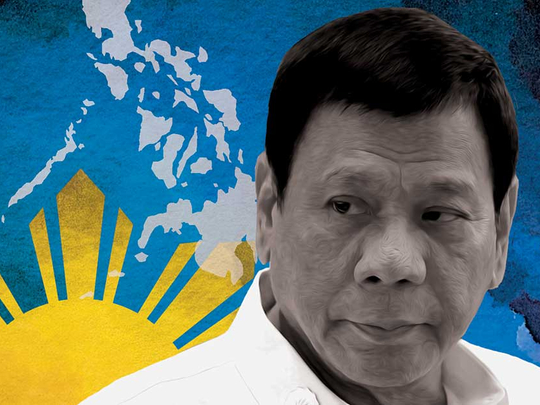
A self-described hitman for vigilante group the Davao Death Squad has testified that the Philippines president, Rodrigo Duterte, not only ordered the murder of criminals and opponents during his 22 years as mayor of Davao City, but had once personally “finished off” a Justice Department employee with a submachine gun.
Edgar Matobato was speaking as part of an inquiry by the Senate into the killings of more than 3,000 Filipinos, said to be part of Duterte’s chaotic crackdown on drugs. To clarify: We are just three months into Rodrigo “the Punisher” Duterte’s presidency and a self-confessed assassin is alleging that, on one occasion, he had fed a victim to a crocodile on behalf of the future president. While Duterte’s obsessive war on narcotics may be horrifying to an international audience, for many Filipinos — even those ambivalent to his presidency — “some action is better than no action” stance has made a welcome change of pace.
This time last year, I was in the Philippines, following ominous reports that Mexico’s infamous Sinaloa cartel was not only present but working with established Filipino-Chinese drug syndicates to take full advantage of the country’s rampant police corruption, lax border controls and comparatively soft narcotic laws for the region.
Ahead of our documentary filming, the Philippine Drug Enforcement Agency had stated that 92 per cent of the districts in Manila were affected by drugs, the overwhelming drug of choice being shabu — a local name for crystal meth. For the third of Filipinos living in poverty, shabu gives the unemployed an income with small-time drug dealing, the hungry a cheap appetite suppressant, and the overworked fuel to work punishing hours.
Duterte’s victory came as the Philippines’ drug problem was becoming so endemic that a firebrand, cartoon-character of a president taking a sledgehammer to the issue, became a reasonable gamble. The Philippines has long suffered at the hands of its politicians’ preoccupation with pomp, pageantry and being profoundly out of touch with the electorate. This was neatly exemplified by Imelda Marcos’ commitment to buying shoes, as the poor starved to death moments away from the presidential palace. In contrast, Duterte has painted himself as a man of the people over the course of a staggering seven terms as mayor of Davao City, his home town.
First appointed after Ferdinand Marcos’s administration was toppled by the people-power revolution in 1986, Duterte’s tough but fair leadership has been credited for Davao’s plummeting crime rates. This has been seen as no mean feat, given that Davao City lies on the coast of the Philippines’ troubled southern island, Mindanao, where the instability caused by insurgency — one of the longest civil conflicts in history — has provided fertile ground for complete and utter lawlessness.
While these latest allegations may sound like they’re veering into the absurd, Duterte has, for the last year, been spelling out his bloodlust to us quite plainly. In April, he nonchalantly regaled crowds at a rally in Iloilo City with a story of how he shot a fellow law student for disrespecting him. It was met with gentle laughter. In May, having been pressed on the Philippines’ track record for attacks on the media, including the 2009 Maguindanao massacre, referred to as “the single deadliest event for journalists in history”, Duterte retorted: “Just because you’re a journalist you are not exempt from assassination, if you’re a [expletive].” Then in June, three weeks before he was sworn in as president, he cheerfully told a rally that: “If you destroy my country, I will kill you.”
But so loyal are Duterte’s devotees that everything from forgoing a motorcade in favour of local taxis or drinking with the locals has been seen as a radical act of humility. In the aftermath of 2013’s devastating Typhoon Haiyan, the then president, Benigno Aquino III, was accused of sitting on his hands. In contrast, Duterte was not only swift to deliver aid to Tacloban, one of the worst-hit areas, but personally visited the devastation, giving a tearful speech criticising local government’s inertia.
Similarly, days after his now infamous comment to United States President Barack Obama, a bomb blast in Davao City killed 15. Within hours of the attack, photos of Duterte at the scene, talking to victims, were circulating on social media, again praising him for being on the ground.
As indisputably dangerous as Duterte is, he is a foul-mouthed, cracking-jokes-about-shooting-people breath of fresh air the Philippines has never experienced before. Duterte’s mass execution of the low hanging fruit in the Philippines drug trade will serve only to highlight how drugs have filled the vacuum created by successive governments. Filipinos did not vote for Duterte; they voted for a jab at the establishment that has, for the past five decades, consistently let them down.
— Guardian News & Media Ltd
Joanna Fuertes-Knight is a British-Filipina filmmaker and journalist. She has produced documentaries for VICE and BBC, with a focus on race, women’s health and the politics of South East Asia.









